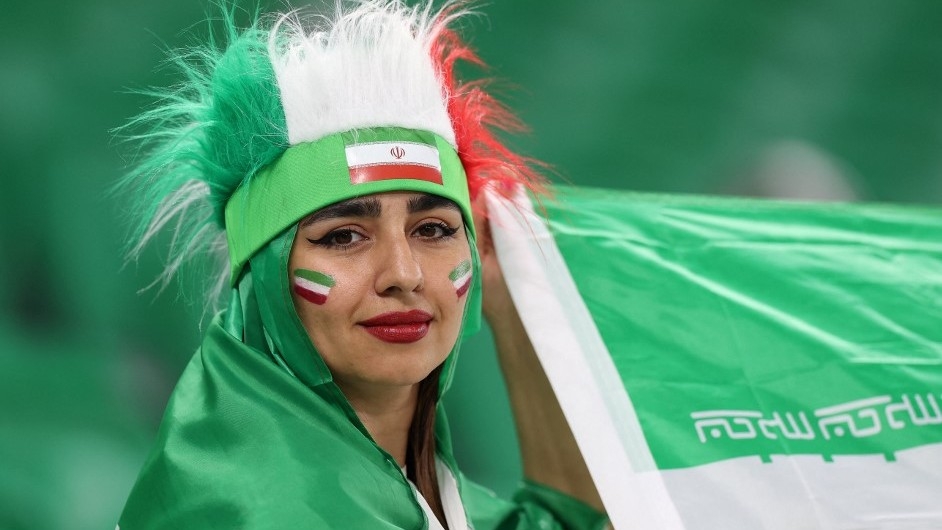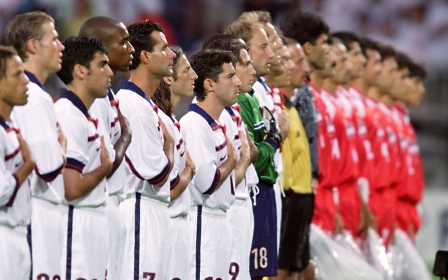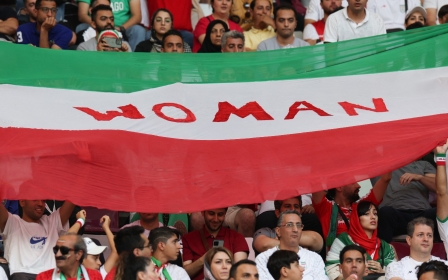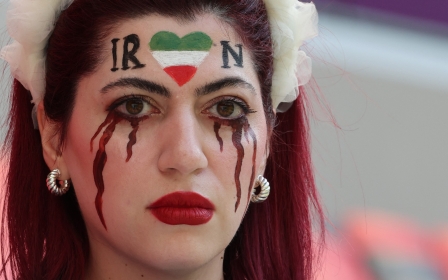World Cup 2022: How Iran's team struggled to walk a political tight-rope

As some Iranians celebrated their team's exit from the World Cup at the hands of the US team, protests in Iran took a deadly turn as the government in Tehran continued its crackdown on opposition groups.
Following the match on Tuesday, some Iranian activists posted videos of crowds celebrating their team's loss and fireworks being let off in some cities.
In northern Iran, where anti-government protests have been fiercest, activists said Mehran Samak, who had joined the celebrations, was shot in the head on Tuesday night.
For a country passionate about football, the team's presence in the World Cup against the backdrop of protests in Iran has been hotly debated, with both the Iranian government and protesters looking to pull the team toward their respective positions.
New MEE newsletter: Jerusalem Dispatch
Sign up to get the latest insights and analysis on Israel-Palestine, alongside Turkey Unpacked and other MEE newsletters
'There are huge debates over what is national and how and for whom the system works: politically, economically, socially, and culturally'
- Shima Vezvaei, Independent Researcher and Journalist
The last time the Iranian and US teams met in a World Cup was 24 years ago when Iran won 2-1 in France in 1998.
"I still remember the time Iran won over the US some 24 years ago," said Shima Vezvaei, an independent researcher and journalist based in Tehran.
"It was a joyous occasion, and you could tell it was a 'national' celebration," said Vezvaei, speaking to Middle East Eye.
Back then, recounted Vezvaei, it was the beginning of the "reformation era," with President Mohammad Khatami winning the elections with 70 percent of the vote on a platform of liberalisation.
"This wasn't the case this time," said Vezvaei. "There are huge debates over what is national and how, and for whom, the system works: politically, economically, socially, and culturally."
The complexity of Iranian society and the current wave of protests were also reflected in the perception of the country's national football team.
Mixed feelings
In their first game against England, the Iranian team stood in silence as the national anthem was played, which was widely interpreted as a sign of their solidarity with the ongoing protests.
Even as Iranian fans came to support their team at the World Cup in Doha, supporters jeered the team in their second match against Wales when some in the team reluctantly sang the anthem.
Iranian society is in flux, believes Vezvaei. "Public opinions are shifting many times in a short period of time. Singing the anthem, not singing the anthem, going, boycotting, who was threatened, was the gesture enough," said Vezvaei reflecting on the debates around the team within and outside the country.
'It's even difficult to say all branches and fractions in solidarity with the uprising were happy with the loss'
-Shima Vezvaei
Since September, Iranian authorities have sought to suppress the nationwide anti-government protests sparked by the death in custody of 22-year-old Mahsa Amini, who was arrested for allegedly wearing her headscarf "inappropriately".
But reducing the issues to simply "football" and suggesting that all Iranian protesters were happy with their team's loss is also not a fair representation, either, warned Vezvaei, adding that: "The public sphere is not homogenised and easy to manipulate.
"It's even difficult to say all branches and fractions in solidarity with the uprising were happy with the loss."
US-Iran footballing narratives
Before the England game, Iran's captain Ehsan Hajsafi said: "We have to accept that the conditions in our country are not right and our people are not happy.
"My people are sad, and our presence here does not mean that we cannot be a voice for them or should not respect them."
But the delicate balancing act pursued by the team couldn't keep both the protesters and the government happy, said Abdollah Abdi, an independent journalist and chief of Abdimedia, a private Iranian news channel based outside the country.
"Some of the protesters were with the Iranian national team and encouraged it while being upset, angry, or in conflict with the government," said Abdi speaking to MEE.
"But some people considered the national team to be the team of the mullahs or the team of the Islamic Republic, not the national team of Iran. Therefore, they considered the loss as the loss of the Islamic Republic, and for that reason, they were celebrating the loss," he added.
'These matches are very important for the Iranian authorities because, with each win, they could confiscate it for their own benefit and suppress the other side in media operations with the resulting publicity'
- Abdollah Abdi, Chief of Abdimedia
"They believe that while a significant number of protesters are in prison or well-known figures in sports, art, and culture, or are in prison, the participation of the Iranian national football team in the current championship is only in line with the propaganda of the Islamic Republic and its purpose," Abdi explained.
Neither was the US side above politicising the game.
Ahead of the match, Iran's football federation said it would file a complaint to Fifa against the US team for removing Iran's central emblem that reads "Allah," a symbol associated with the country's 1979 revolution.
Following the Iran match, US president Joe Biden grabbed the microphone at a political rally to lead a crowd in chanting the country's nationalistic slogan, "USA! USA!"
"When I spoke to the coach and the players, I said, 'you can do this!'," said Biden, adding: "They did it, God love 'em."
The Iranian government, however, is also not above using sport to further its goals, said Abdi.
"These matches are very important for the Iranian authorities because, with each win, they could confiscate it for their own benefit and suppress the other side in media operations with the resulting publicity," he said.
Periphery leading protests
However, the solution to the Iranian protests will be determined from within, particularly from the country's "periphery," its women and minorities, according to Shima Vezvaei from Tehran.
Different communities in Iran are "hurt, and they want tangible change, which hasn't happened yet," said Vezvaei.
"The authorities played for sure with the feelings of people by using all sorts of nationalist propaganda and trying to frame the issue in the dichotomy of love/hate for the nation," said Vezvaei.
"I don't think it should be the focus here. I still believe the love for football and footballers runs through the veins of the people of this country, and that made everything that has happened heart-wrenching."
Middle East Eye delivers independent and unrivalled coverage and analysis of the Middle East, North Africa and beyond. To learn more about republishing this content and the associated fees, please fill out this form. More about MEE can be found here.




